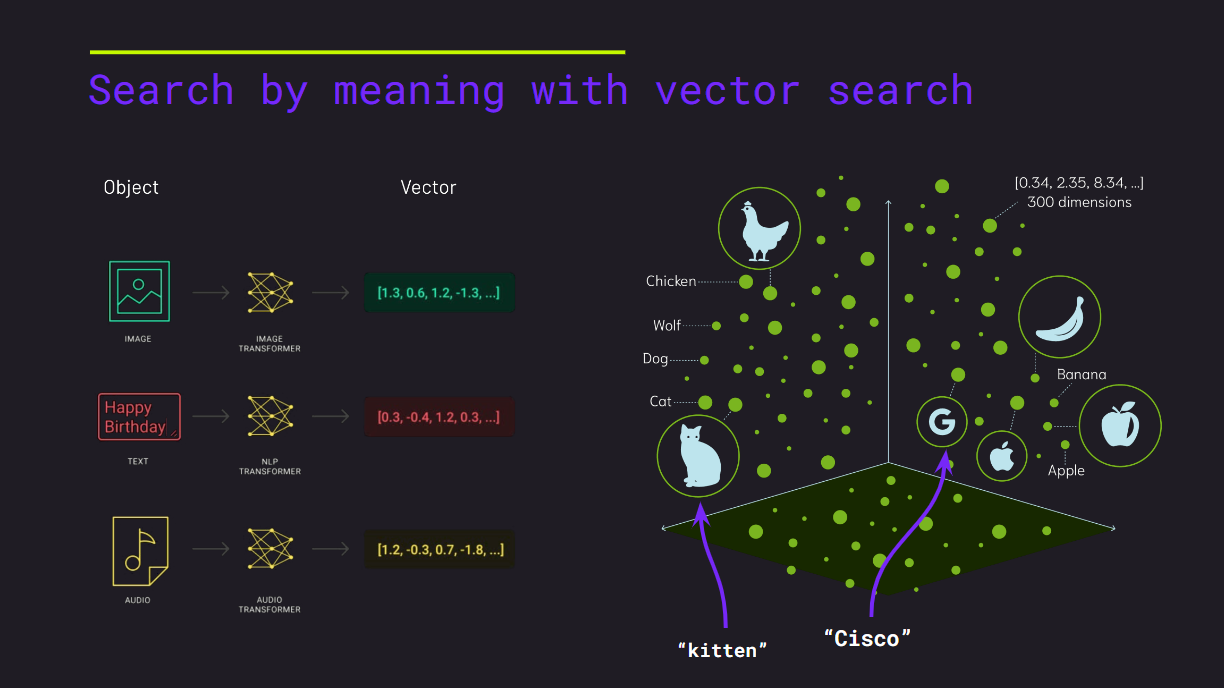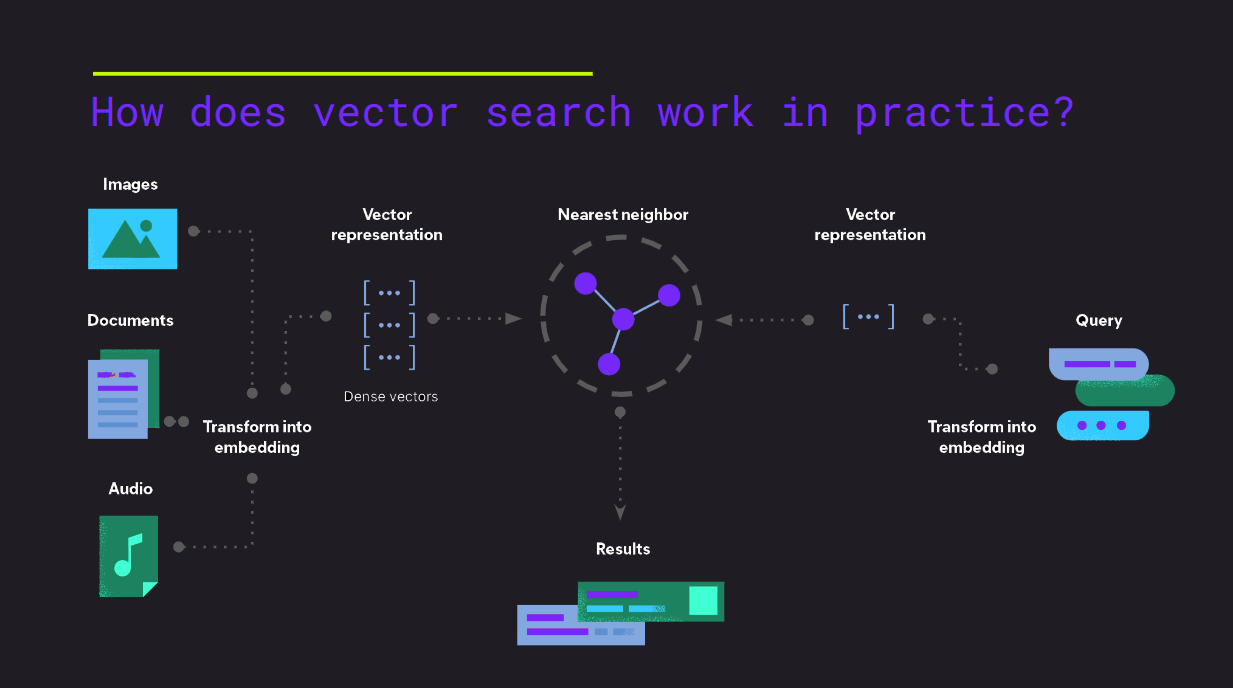Search technology has undergone an incredible transformation over the past few years. It began with simple, directory-based methods and evolved into sophisticated algorithms capable of interpreting the nuances of human language.
Mostly of the systems until today rely heavily on keyword matching. However, this approach has a lot of limitations, often overlooking the context or the true intent behind a user's query.
So the need for a more intelligent search became apparent. This need led to the rise of artificial intelligence (AI) in search technologies, giving birth to vector search, a method that understands queries and content at a much deeper level. By prioritizing context and semantics, vector search can discern the meaning behind words, providing more accurate and relevant results.
What is Search by Keywords?
Keyword-based search is the foundation upon which traditional search engines were built. It involves searching through documents to find matches for specified words or phrases. Despite its straightforward nature, this method has drawbacks---it lacks the ability to understand the context or the intent behind the search query. This limitation often results in a list of results that contain the keywords but may be irrelevant to what the user is actually looking for.
History of Keyword Search Technologies
The origins of keyword search can be traced back to the early days of library science. The creation of the index, a systematic list intended to direct the reader to information within a book, was the precursor to keyword indexing. As computers emerged, these principles were adopted and transformed into digital indexing, with keyword search becoming a fundamental component of early database management systems.
The 1960s and 1970s saw the introduction of systems like IBM's STAIRS (Storage and Information Retrieval System) and the first online search engine for the general public, Archie, which was created in 1990. These systems relied on users entering precise terms to find documents. The principle was straightforward: the search tool would scan databases for the presence of the user's specified terms.
Despite the evolution of search technologies, many systems today still rely on the fundamentals of keyword search due to its simplicity and efficiency. Databases, programming IDEs (Integrated Development Environments), and even some search engines continue to utilize keyword search as part of their functionality.
- Continual Use in Modern Systems
Keyword search hasn't been completely eclipsed by more advanced technologies; it's still in use in various capacities. For instance, while Google has advanced to semantic search, it still incorporates keyword search techniques in its algorithms. In programming, IDEs use keyword search to assist developers in finding specific functions or variables in their codebase.
The legacy of keyword search is enduring, providing a foundation upon which more complex search technologies have been built.
The Shift to AI-Driven Search
Transition to AI and Vector Search
AI has revolutionized this scenario. With the advent of AI, search engines no longer simply match keywords but interpret the meaning of a query. This advancement is due to algorithms capable of understanding synonyms, themes, and the overall context of a search. It represents a shift from what is being asked to why it's being asked, allowing search technologies to provide answers that are contextually relevant, even if the keywords aren't a perfect match.
AI in search harnesses a variety of algorithms, but one of the most transformative has been vector search. Vector search transcends the limits of keyword matching by representing words and phrases as vectors --- essentially, points in a multi-dimensional space. This allows the search system to measure the semantic similarity between the content and a query, even if the exact words are not used.
Vector search isn't just a theoretical concept. It's embedded in several everyday applications, from the auto-suggestions in your email to the recommended articles on a news site. For instance, when you type a message in your email client, the AI can suggest ways to complete your sentence that make sense within the context of what you've already typed. Similarly, news aggregators use AI to recommend articles related to what you've read, even if the keywords differ.
To exemplify the AI algorithms at work, consider the process of online shopping. When you search for "running shoes," the AI-powered search doesn't just look for the words "running" and "shoes" in product listings. It understands related concepts like "sneakers," "athletic footwear," or "trail running" and can bring up products that align with the concept of running shoes, broadening your options and refining the relevancy of the search results.
Understanding Vector Search
Vector search represents a groundbreaking approach in search technology, effectively transforming text into a language that computers can understand --- numerical vectors. In essence, every piece of text, whether a word, sentence, or document, is converted into a list of numbers that capture its semantic meaning.
Converting data/objects to Numerical Vectors

How does this work in practice? Take a sentence like "The cat and the chicken love apples" An AI model processes this sentence and represents it as a point in a high-dimensional space, each dimension corresponding to a feature learned from analyzing large datasets. These features might encapsulate aspects of syntax, word order, and even hidden semantic qualities that we, as humans, intuitively understand.
For example, the word "kitten" would be transformed into a dense vector, say [0.85, -0.24, 1.58, ...], where each number reflects a nuance of its meaning, its use in language, and its relationship to other words. A search query is transformed into a vector in the same space, and the search engine finds the document vectors closest to the query vector; So the word "kitten" can appear as a result for the sentence that we used before.
The Mathematics Behind Vector Space
The mathematics of vector spaces is both elegant and powerful. By defining a measure of distance or similarity between vectors, search engines can identify which documents are most relevant to a query. This is where cosine similarity comes in --- a metric that measures the cosine of the angle between two vectors. If the vectors are pointing in the same direction, the cosine similarity is high, indicating a strong semantic match.

SuperDuperDB: At the Forefront of Vector Search
SuperDuperDB emerge as a game-changer in this domain, harnessing the power of vector search to process and comprehend vast datasets.
How SuperDuperDB Processes and Understands Large Datasets
SuperDuperDB implements sophisticated indexing techniques to make vector search not only accurate but also lightning-fast. When a new piece of data is ingested, SuperDuperDB converts it into its vector form using transformer models. These vectors are then indexed in such a way that similar vectors are positioned near each other, thus accelerating the search for nearest neighbors.
SuperDuperDB allows users to implement vector-search in their database by either using in-database functionality, or via a sidecar implementation with lance and FastAPI.
- Philosophy
In SuperDuperDB, from a user point-of-view vector-search it's similar compared with other ways of using the system:
- The vector-preparation is exactly the same as preparing outputs with any model, with the special difference that the outputs are vectors, arrays or tensors.
- Vector-searches are just another type of database query which happen to use the stored vectors.
- Integrating SuperDuperDB with Other Systems for Enhanced Search
The real power of SuperDuperDB shines when it's integrated into broader systems, where its vector search capabilities can be applied to enhance the functionality of applications ranging from recommendation engines to ecommerces and advanced analytics platforms.
Predicting the Future: AI and Beyond in Search Technologies
As we look ahead, the potential for AI in search technologies is boundless. With the continuous advancements in machine learning, natural language processing (NLP), and deep learning, search engines are becoming increasingly sophisticated.
The Role of Emerging Technologies
Machine learning algorithms are constantly improving, allowing for more accurate vector representations of text, which will make search results even more precise and contextually relevant. NLP and deep learning contribute to understanding human language in all its complexity, enabling search engines to comprehend queries and content at a level that approaches human understanding.
We can expect to see AI-powered search engines that not only understand the content in multiple languages but also grasp the sentiment, emotion, and subtleties contained within. The convergence of AI with other emerging technologies like augmented reality could lead to search capabilities integrated into our real-world experiences, offering information and content in interactive, visually rich formats.
SuperDuperDB is well-positioned to lead these advancements by providing the backbone for such innovative search experiences. It's designed to scale with these technologies, ensuring that as the algorithms and models evolve, SuperDuperDB will seamlessly enhance its capabilities to support the ever-growing demands of AI-driven search.
The future of search with SuperDuperDB
The journey from simple keyword searches to the dynamic, AI-powered vector search of today represents a massive leap forward in technology. SuperDuperDB sits at the heart of this evolution, not as a passive participant but as a driving force for further innovation.
As we embrace the changes brought forth by AI in search, SuperDuperDB will continue to evolve, providing developers and enterprises with the tools they need to build the next generation of intelligent applications. The potential of search technology is only beginning to be tapped, and with SuperDuperDB, we're on the cusp of discovering just how deep the well of possibility goes. The platform is more than a database; it's a foundational component that will support and drive the search technologies of tomorrow.
Useful Links
Contributors are welcome!
SuperDuperDB is open-source and permissively licensed under the Apache 2.0 license. We would like to encourage developers interested in open-source development to contribute in our discussion forums, issue boards and by making their own pull requests. We'll see you on GitHub!